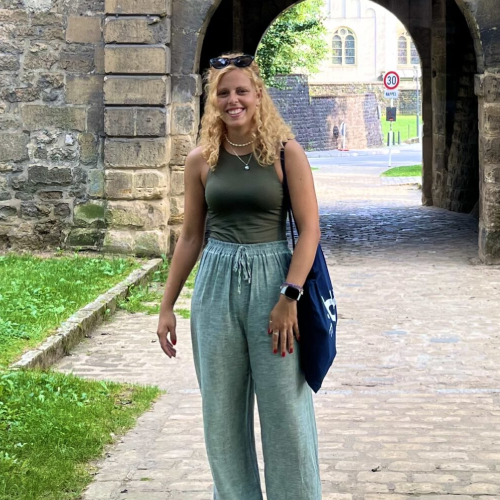

Twenty-two-year-old Sophie Brazil is studying History and English at the University of Regensburg in Germany and wants to be a teacher of English when she finishes.
Currently she is undertaking a virtual exchange with students from Israel and Turkey. They are all trainee teachers and the main goal of this international collaboration is to create a task-based learning objective for students of high or middle school. They need to incorporate elements of the United Nations Sustainable Development Goals (UNSDGs) when designing their project.
“We’re a team of six’, she explains. Two from Israel, two from Turkey and us two from Germany. Although neither of us is German. I’m Brazilian and this makes for a very interesting exchange as we’re quite a diverse group.”
Structure of the Virtual Exchange
“We need to organise ourselves to meet up and organise our work – how and when to meet and what to discuss at each meeting. We talk about our personal interests and hopes and dreams as well as discussing wider global and local issues.
“We talk about marriage and kids too, as we are all at different stages of our lives. I’m only 22 and others in my team are older. Some are married and have kids and this means that at times, I cannot relate to their issues. They need to tend to their kids and their husbands so we sometimes have trouble finding time for each other. This is one of our major challenges but we are managing very well so far.”
Intercultural Challenges
“As I mentioned before, timing is challenging due to everyone’s other commitments.
But something interesting has come out is how we are learning to teach at our respective universities. There is a major difference between our cultures. Here in Germany, I am learning that as teachers, we are ‘guides’ and have a supporter role. But that’s not the case with my peers as they have to tell the students to do everything. They have more of a controlling attitude to teaching and tell the students exactly what to do at every step of the way. It’s much more interventionist as an approach.
“To be honest, I like our approach more – as a ‘guide’. I’ve done the ‘controlling’ type courses and I liked it less. Having said that, I understand the other approach and it’s valid too.
Peer learning
“There is lots of peer learning in this virtual exchange project. We have to take all suggestions on board and we have to find the tricky middle ground. But after 3 months of working together, we are getting close to finishing up the task which is due in the new year.
“I’d say we are at a good point now and we are becoming friends too as we understand each other a lot more having discussed our personal stuff at the beginning. We have learned how to discuss things and what makes the other tick, so there is a relationship being formed and I like meeting people from other cultures. We are all curious about each other and ask about other things outside of the project.
“The tasks we are creating encourage relationship building, just like we did. So building up from simple exchanges about food and interests and moving on to local issues for example.
Impact of local issues on the collaborative process
“In spite of the difficult situation in the Middle East, we have not really spoken about this in our group. But, I have heard from others that the ongoing war does impact their conversations. I mean, we have discussed power outages and gender imbalances, but we haven’t discussed the politics of what is happening over there.
“But we do hear of students having to go to bunkers because of the bombing, therefore they are unable to participate in the meetings. It’s obviously a very delicate situation and we have to be aware and mindful of this.
“We have an obligation to be human and understand the difficulties they are facing. We can’t relate to anything so extreme as they are having to deal with but I am aware we need to be there for them just in case. This is where the cultural exchange really teaches you something. We have to be understanding in this situation.
“This is something I have learned and am aware of since undertaking this international project. I know we need to be supportive and be a good listener and a good friend.“
Main goal of the virtual exchange
“The main aim of this international collaboration is for us to become global citizens and to understand other cultures. For that to happen, we need to be open to it.
“We learn to minimise ‘othering’ and we understand that we are all individuals and aren’t representative of the whole of our country. We are all different and our backgrounds impact on how we turn out and how we think and what our attitude is to things. That’s my main takeaway – to have an open mind about other cultures and avoid the stereotyping.
I would definitely advise others to do an exchange like this. You develop yourself in many areas and it’s a great learning curve, especially your collaborative and team skills. It’s worth a try for sure!”
